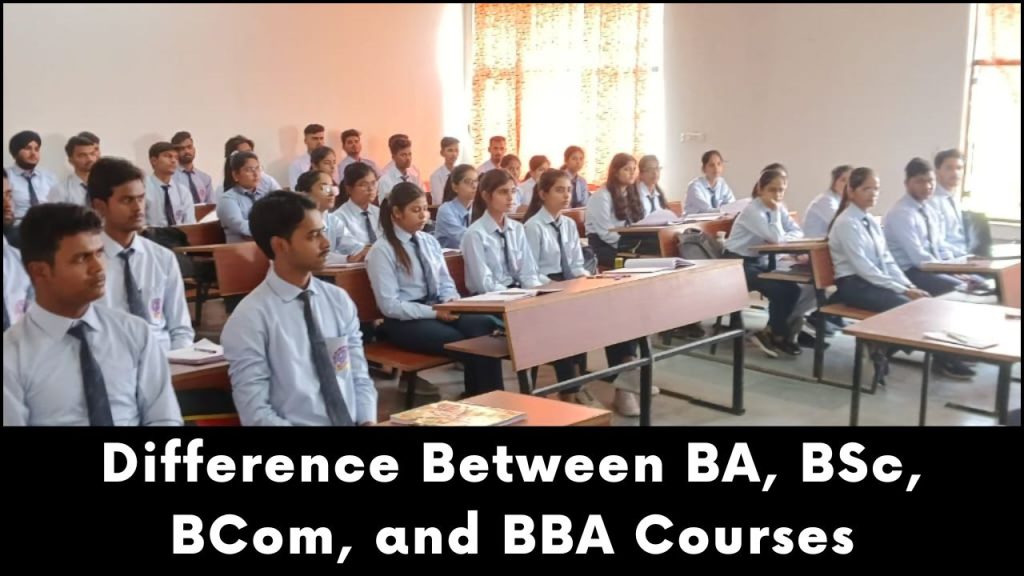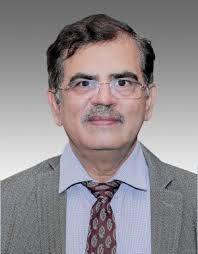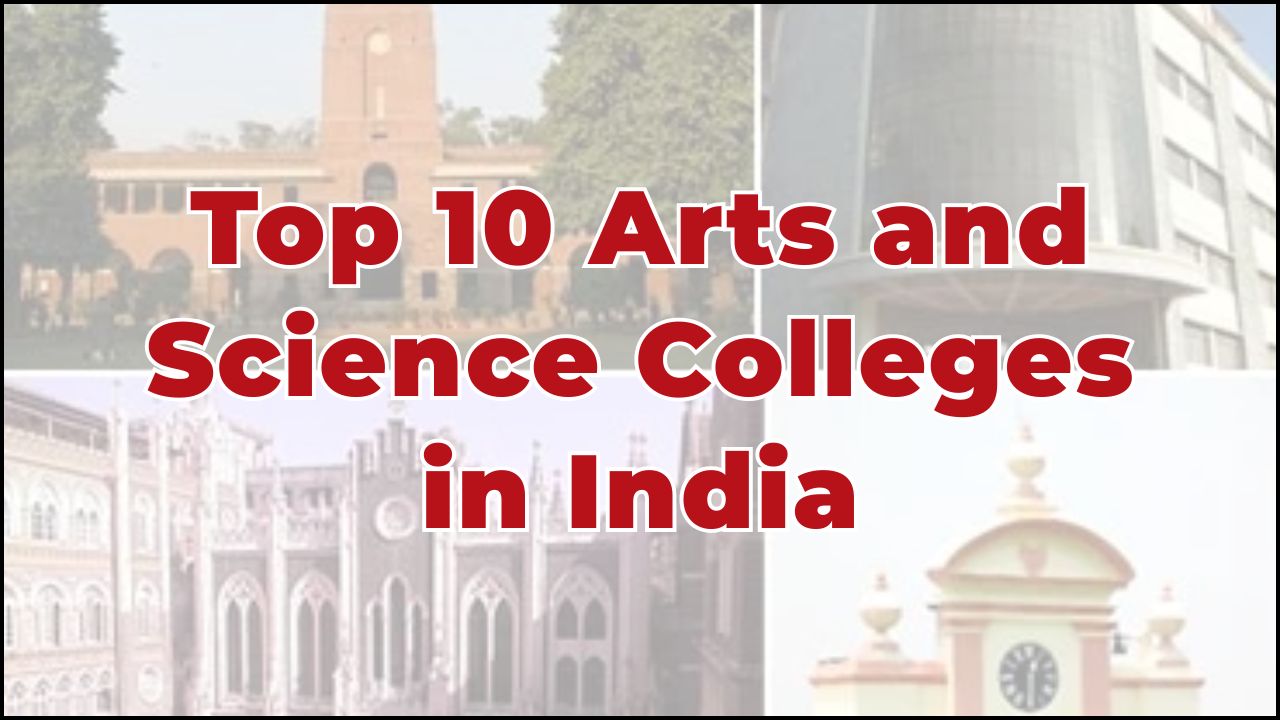
It is a crucial step to choose the course after the 12th class. It depends on various factors that which course you are going to choose. Some students chose the course because of the subjects, some prefer the career opportunity, or the type of job they want to do after the course. In this article, we will explore the details of BA, BSC, BCOM, and BBA, check now.
Course Overview
| Course | Full Form | Field of Study | Course Duration | Eligibility |
|---|---|---|---|---|
| BA | Bachelor of Arts | Humanities, Social Sciences | 3 years | 12th Class (Any Stream) |
| BSc | Bachelor of Science | Science, Mathematics, IT | 3 years | 12th Class (Science Stream) |
| BCom | Bachelor of Commerce | Commerce, Finance, Accounting | 3 years | 12th Class (Commerce Preferred) |
| BBA | Bachelor of Business Administration | Business, Management, Marketing | 3 years | 12th Class (Any Stream, Math Preferred) |
Key Subjects in Each Course
The names of subjects for each course are given here.
BA (Bachelor of Arts)
- English Literature
- History
- Political Science
- Psychology
- Sociology
- Public Administration
BSc (Bachelor of Science)
- Physics
- Chemistry
- Biology
- Mathematics
- Computer Science
- Environmental Science
BCom (Bachelor of Commerce)
- Accounting
- Business Studies
- Economics
- Taxation
- Cost Accounting
- Business Law
BBA (Bachelor of Business Administration)
- Business Management
- Marketing
- Human Resource Management
- Financial Accounting
- Organizational Behaviour
- Entrepreneurship
Skills Developed in Each Course
| Course | Skills Developed |
|---|---|
| BA | Critical thinking, communication, analytical reasoning, writing skills |
| BSc | Critical thinking, communication, analytical reasoning, and writing skills |
| BCom | Problem-solving, research ability, technical knowledge, and numerical aptitude |
| BBA | Leadership, teamwork, business planning, presentation skills, managerial thinking |
BA Course Career Options
- Teacher – Primary/Secondary Level (Rs 2,50,000 to Rs 4,00,000 per year)
- Content Writer – Online platforms, publishing houses (Rs 2,00,000 to Rs 4,50,000 per year)
- Civil Services Aspirant – Preparation for UPSC, SSC, State Exams
- Journalist – News channels, magazines (Rs 3,00,000 to Rs 6,00,000 per year)
- Social Worker – NGOs, government departments (Rs 2,00,000 to Rs 5,00,000 per year)
BSc Course Career Options
- Lab Technician – Hospitals, research labs (Rs 2,00,000 to Rs 4,00,000 per year)
- Data Analyst – IT firms, banks, consultancies (Rs 3,50,000 to Rs 6,00,000 per year)
- Scientist (after MSc/PhD) – ISRO, DRDO, CSIR (Rs 6,00,000 to Rs 12,00,000 per year)
- Software Developer (with CS background) – IT companies (Rs 4,00,000 to Rs 10,00,000 per year)
- Environmental Consultant – NGOs, corporate firms (Rs 3,00,000 to Rs 5,00,000 per year)
BCom Course Career Options
- Accountant – CA firms, companies (Rs 3,00,000 to Rs 5,00,000 per year)
- Banking Professional – Clerk/PO in banks (Rs 4,00,000 to Rs 7,00,000 per year)
- Tax Consultant – Firms, individuals (Rs 3,00,000 to Rs 6,00,000 per year)
- Auditor (after CA/ICWA) – Corporates, government (Rs 6,00,000 to Rs 12,00,000 per year)
- Financial Analyst – Stock market firms, investment companies (Rs 4,00,000 to Rs 8,00,000 per year)
BBA Course Career Options
- Marketing Executive – Advertising firms, brands (Rs 3,00,000 to Rs 5,00,000 per year)
- HR Executive – Recruitment, training (Rs 3,00,000 to Rs 5,50,000 per year)
- Business Analyst – Consulting firms (Rs 4,00,000 to Rs 7,00,000 per year)
- Operations Manager (after MBA) – Manufacturing, services (Rs 6,00,000 to Rs 12,00,000 per year)
- Entrepreneur – Own business, startups (Income varies widely)
Higher Study Options After Each Course
| Course | Higher Studies Options |
|---|---|
| BA | MA, MPhil, PhD, B.Ed, Journalism Diploma, LLB |
| BSc | MSc, MTech, PhD, MBA, MCA |
| BCom | MCom, MBA, CA, CS, CFA, ICWA |
| BBA | MBA, PGDM, MMS, Law, Business Analytics Certification |
Which Course is Best?
We can not say that this course is best or that course is best, it depends on you, what you want to become in each field, as each field will give you good earnings.
- BA is best for students interested in literature, civil services, or teaching careers.
- The BSc course is suitable for science lovers who want to pursue research, technology, or lab work.
- BCom is ideal for those planning a career in commerce, accounting, or finance.
- BBA is great for students who wish to become business leaders, managers, or marketers.
Government Job Opportunities After Each Course
| Course | Government Sectors |
|---|---|
| BA | UPSC, SSC, State PSC, Railways, Teaching (TET, CTET) |
| BSc | DRDO, ISRO, SSC CGL, Banking, Agriculture Research |
| BCom | Banking (IBPS, SBI), Income Tax Department, Audit, SSC |
| BBA | SSC CGL, Banking, PSU Management Roles, Railways |
Eligibility Criteria and Admission
- BA, BCom, and BBA are open to students from any stream in Class 12. A commerce background is preferred for BCom.
- BSc is only for students from the science stream (Physics, Chemistry, Biology/Mathematics).
- Admission Process
- Mostly merit-based in government universities
- Some private colleges may conduct entrance exams
- Direct admissions are common in many institutions
The Way Forward
Each course offers different opportunities, and choosing the right one depends on a student’s strengths and career interests. BA, BSc, BCom, and BBA are all valuable in their ways. A smart choice made after understanding the career scope, skills required, and pay levels can lead to a successful and satisfying professional life.

Mangesh garg is a passionate writer known for captivating stories that blend imagination and reality. Inspired by travel, history, and everyday moments, He crafts narratives that resonate deeply with readers.


